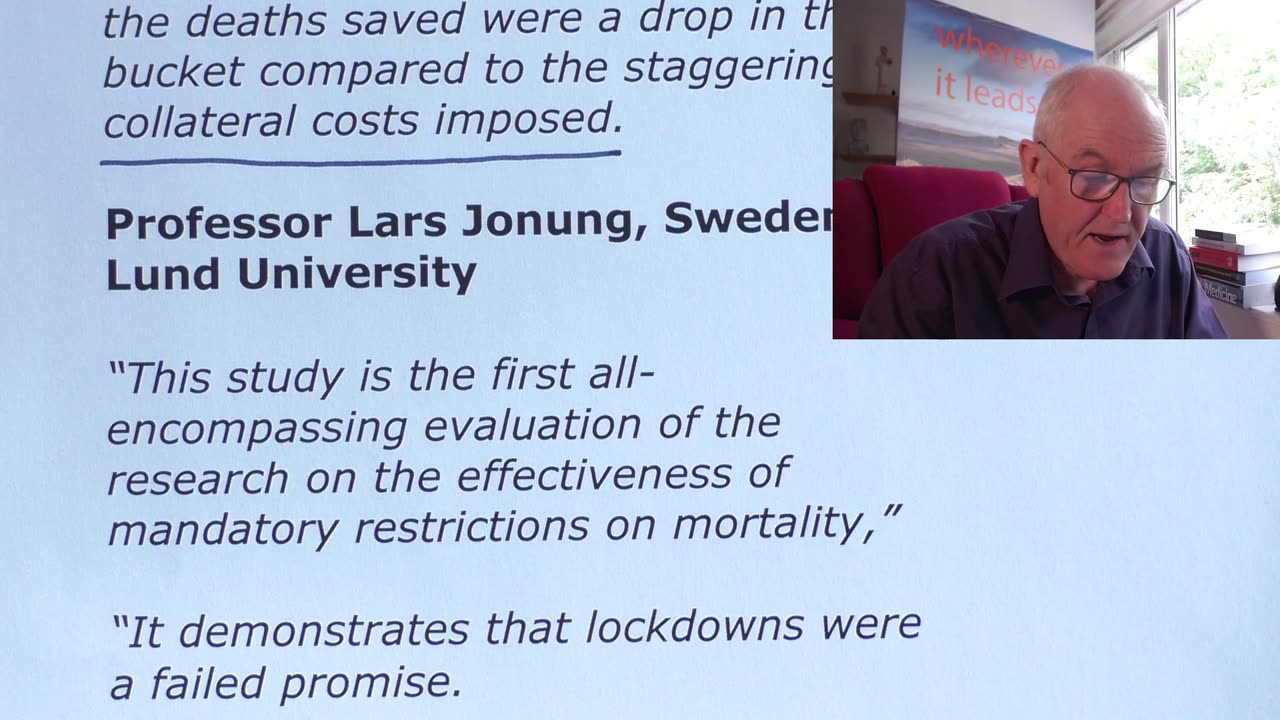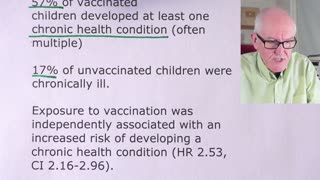Premium Only Content

Lockdowns, a global policy failure
Lockdowns were a costly failure
COVID-19 lockdowns were ‘a global policy failure of gigantic proportions’
5th June 2023 update
https://iea.org.uk/publications/did-lockdowns-work-the-verdict-on-covid-restrictions/
Previous January 2022 publication
https://sites.krieger.jhu.edu/iae/files/2022/01/A-Literature-Review-and-Meta-Analysis-of-the-Effects-of-Lockdowns-on-COVID-19-Mortality.pdf
Systematic review and meta-analysis
Published by Institute of Economic Affairs (London)
Did lockdowns, (Covid restrictions, social distancing measures etc.)
Effect COVID-19 mortality, based on empirical evidence.
Systematic search and screening procedure
19,646 studies identified
32 studies qualified.
Of those, 22 studies could convert for meta- analysis.
22 studies based on actual, measured mortality data,
not results derived from modelling.
Stringency index studies
(when compared to less strict lockdown policies e.g. Sweden)
Average lockdown in Europe and the United States,
in the spring of 2020,
only reduced COVID-19 mortality by 3.2%
This translates into
Approximately 6,000 avoided deaths in Europe,
and 4,000 in the United States.
Shelter-in-place-order (SIPO)
Relatively ineffective in the spring of 2020,
reducing COVID-19 mortality by 2.0%
4,000 avoided deaths in Europe,
and 3,000 in the United States.
Specific NPIs
Spring of 2020
Reduced COVID-19 mortality by 10.7%
(significantly less than estimates produced by epidemiological modelling)
That’s approximately 23,000 avoided deaths in Europe,
and 16,000 in the United States.
Imperial College of London’s modelling exercises
(March 2020), predicted lockdowns would save over 400,000 lives in the United Kingdom,
and over 2 million lives in the United States
In comparison, annual flu deaths
Approximately 72,000 flu deaths in Europe,
and 38,000 flu deaths in the United States
England and Wales, 18,500–24,800 flu deaths
When checked for potential biases, our results are robust.
Our results are also supported by the natural experiments we have been able to identify.
The results of our meta-analysis support the conclusion that lockdowns in the spring of 2020 had a negligible effect on COVID-19 mortality.
This result is consistent with the view that voluntary changes in behaviour,
such as social distancing, did play an important role in mitigating the pandemic.
Voluntary measures, effectively reduced COVID mortality in Sweden
(consistent with evidence early in the pandemic that voluntary action began reducing transmission before lockdowns)
This negative conclusion is amplified by significant economic and social costs
Stunted economic growth
Large increases in public debt
Rising inequality
Damage to children’s education and health
Reduced health-related quality of life
Increased crime
Threats to democracy and loss of freedom
(Covid Disinformation Unit, 77 Brigade)
Damage to mental health
Conclusion
Unless substantial alternative evidence emerges, lockdowns should be ‘rejected out of hand’ to control future pandemics.
The science of lockdowns is clear; the data are in:
the deaths saved were a drop in the bucket compared to the staggering collateral costs imposed.
Professor Lars Jonung, Sweden, Lund University
“This study is the first all-encompassing evaluation of the research on the effectiveness of mandatory restrictions on mortality,”
“It demonstrates that lockdowns were a failed promise.
They had negligible health effects but disastrous economic, social and political costs to society.
Most likely lockdowns represent the biggest policy mistake in modern times.”
Jonas Herby, Copenhagen
“Numerous misleading studies,
driven by subjective models and overlooking significant factors like voluntary behaviour changes,
heavily influenced the initial perception of lockdowns as highly effective measures.
Our meta-analysis suggests that when researchers account for additional variables,
such as voluntary behaviour, the impact of lockdowns becomes negligible.”
Professor Steve H. Hanke, Johns Hopkins University
“When it comes to COVID, epidemiological models have many things in common: dubious assumptions, hair-raising predictions of disaster that miss the mark, and few lessons learned.
“The science of lockdowns is clear; the data are in: the lives saved were a drop in the bucket compared to the staggering collateral costs imposed.”
https://www.telegraph.co.uk/news/2023/06/04/cost-of-lockdown-negligible-health-benefits-for-liberty/
https://www.telegraph.co.uk/news/2023/06/04/covid-19-lockdowns-less-effective-new-research-inquiry/
-
 17:51
17:51
Dr. John Campbell
20 days agoMore chronic disease after vccination
18.6K97 -
 LIVE
LIVE
Major League Fishing
8 days agoLIVE! - Fishing Clash Team Series: Patriot Cup - Day 3
314 watching -
 LIVE
LIVE
Times Now World
14 hours agoPUTIN PRESSER LIVE | “We Won’t Be Intimidated” — Moscow Warns U.S. After Trump’s Oil Sanctions
110 watching -
 18:35
18:35
Odd Man Out
2 days agoFrance's shame of the century all for DEI pandering
9.82K88 -
 2:12:37
2:12:37
The Quartering
4 hours agoWe've Been Invaded By Low IQ Killing Machines
131K19 -
 1:08:08
1:08:08
Jeff Ahern
2 hours agoFriday Freak out with Jeff Ahern
3.04K2 -
 LIVE
LIVE
Side Scrollers Podcast
1 day ago🔴SIDE SCROLLERS SUB-A-THON🔴FINAL DAY!🔴Craig Makeover + US Dart Throw + More!
1,091 watching -
 9:26
9:26
Rethinking the Dollar
5 hours agoCar Gone. Job Gone. Hope Gone? The Silent Debt Crisis In America
8.4K7 -
 2:10:21
2:10:21
The Culture War with Tim Pool
5 hours agoLeftist TERROR Attack On Coast Guard, Liberals Claim Trump Is A TYRANT | The Culture War DEBATE
128K323 -
 23:38
23:38
Professor Nez
3 hours ago🚨NO WAY HE RECOVERS! Trump CONFRONTS Aussie Ambassador & Finishes Him Off
23.4K12